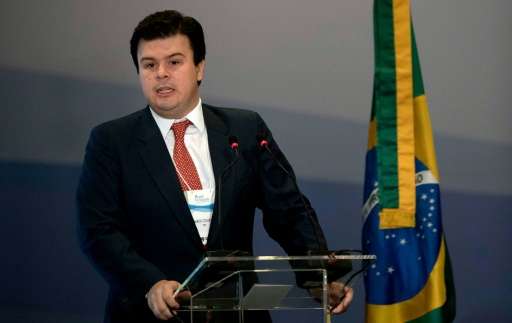Brazil's Minister of Energy Fernando Coelho Filho speaks during the National Petroleum Agency (ANP) oil field auction at a hotel in Rio de Janeiro, Brazil on September 27, 2017
Brazil's government notched up a record oil auction Wednesday, with sales of several dozen of the 287 exploration blocks on offer fetching more than $1 billion in Rio de Janeiro.
The auctions for exploration rights in the mostly offshore fields were an early test of President Michel Temer's policy of loosening regulations and luring foreign investors to bring billions of dollars into the moribund economy.
The National Petroleum Agency put 287 land and offshore exploration blocks under the hammer and although only 37 found buyers, the bottom line was far stronger than expected.
Agency director Decio Oddone said he had only expected sales of around 500 million reais ($157 million), but the sale ultimately fetched $1.2 billion.
The government also auctioned off operating licenses to four hydroelectric facilities for $3.8 billion, two of them to French group Engie, one to China's State Power Investment Corporation and one to Italy's Enel Spa.
Initial trade for the oil blocks was hesitant, ending with only 13 percent of the blocks finding buyers. The agency had hoped for 20-30 percent sales.
But the biggest deal saw Brazil's national champion Petrobras teaming with Exxon Mobil to snap up exploration blocks in the offshore Campos region, which borders the even deeper—and hugely rich—"pre-salt" zones. Just one of those blocks sold for a record 2.24 billion reais ($700 million).
This more than compensated for the weak volume of sales.
Those pre-salt zones will come up in the keenly awaited next round of auctions October 27. The pre-salt fields have some of the world's biggest reserves, albeit requiring the technical capabilities to drill in such hostile conditions.
Twenty-five companies had expressed interest in the eight pre-salt blocks on offer, the mining and energy ministry said earlier this month.
The sales are part of a series of nine scheduled auctions that Brazil hopes will rack up as much as $80 billion by the end of 2019, a big boost to a government that is deeply in the red and struggling to nudge the economy out of its worst recession in history.
© 2017 AFP
























